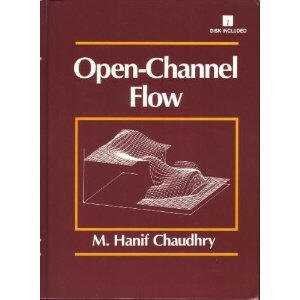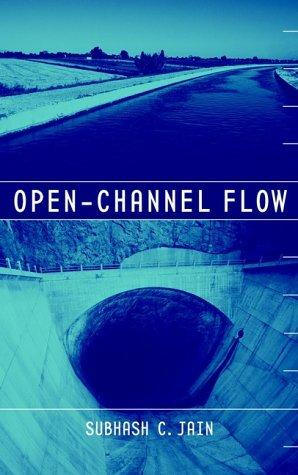Course
Description: |
In this course you will learn how to use
basic governing equations of Fluid Flow for problems in
Water Resources engineering. We will start with a review of the basic
concepts of fluid flow, such as the use governing equations,
terminology, and definitions. After refreshing this knowledge we
will apply these concepts to typical Open Channel Flow problems, such as
man made channels and flow control structures, and start examining in
detail why "free surface" flow has to behave in certain ways and not in
others (perhaps more intuitive ones). Once we have
mastered that we will then apply our newly gained knowledge to some
design scenarios in which we need to find solutions to complex
constraints. During this course you will be exposed some numerical
techniques as well because you will learn that flow problems invariant
in space and time complicate our live dramatically and cannot be handled
through the use of analytical solutions only. We may introduce a guest
lecture to this course in which you hear about some numerical approaches
to Open Channel Flow. We will round out the course with some special
Open Channel Flow topics such a Culverts, and Lateral In- and Outflow. |
| |
|
| PreReqs: |
There are no specific prerequisites for this
class, but I strongly recommend CE 350 "Fluid Mechanics" (or
equivalent in another department) and if possible CE 365 "Hydrology
and Hydraulics" or equivalent. This means it is open to seniors looking for some higher level
electives, in addition to MS and PhD students. Notice that I will move through the course material at a good clip. There
will be no special make up sessions as a result of you falling behind or
not being able to catch up on the side with those things you have not
yet been exposed to. This is up to you. |
| |
|
| Course
Objectives: |
The Homeworks you will be assigned are work
intense and also quite challenging a times but they will enable you to:
-
Apply the Energy principle to solutions of Open
Channel Flow problems and understand what the limitations are;
-
Understand the
mechanisms that resist flow and what type of approach can be taken
to account for this resistance analytically;
-
Apply the Momentum
principle to the movement of Open Channel Flow, and understand its
complementary nature to the Energy approach.
-
Understand deterministic
approaches to Open Channel Flow (Uniform Flow) and the assumptions
and limitations they imply.
-
Apply the principles of
non-uniform flow equations (Gradually Varied Flow) and how to
numerically compute solutions to this first order ODE;
-
Apply the flow equations
to typical problems in Open Channel Flow, such as Choking, Drowning,
and the Discharge Problem;
-
Understand the concept
of Critical Flow and its importance as a control for Open Channel
Flow; computation and locale determination;
-
Analyze the 1-D unsteady
Open Channel Flow equations (St Venant equations) and numerical
(finite difference) approaches to solve them;
- Apply the principles learned in
class for analyzing and computing Culvert Flow; seizing and
controls.
|
| |
|
|
Text: |
For this class you will need a copy of the
following book as all HWs are being assigned from it.
Note that this IS a required book.
"Open Channel Flow" by Henderson, published
MacMillan Series in Civil Engineering, If you go to Amazon you can find
the book for ~$135 (new) or ~$70 (used).
http://www.amazon.com/Open-Channel-Macmillan-Civil-Engineering/dp/0023535105
I can also recommend a couple of other Open
Channel Flow books, such as:
|
 |
"Open Channel Flow"
by Chaudry, published by Prentice Hall |
|
 |
"Open Channel Flow"
by Jain, published by Wiley |
| |
|
| Project: |
A key component of this class will be the
execution of a small Open Channel Flow project. The purpose of this project is
for you to take the knowledge gained and turn it into a usable tool. My
experience has shown that having to implement the concepts we learned
into a code that works requires a very intense immersion into the
various aspects with resulting high degree of understanding. The required report and the final
presentation are intended to give you another opportunity to hone your
skills in properly documenting a project and also to present
your findings to an audience in a concise and precise manner. Each student will do his/her own project; no partnering up. |
| |
|
|
Grading: |
Final Exam |
30% |
The final exam will be a in-class exam with problems from the book. |
| |
Homeworks |
25% |
The homeworks are due either 1 or 2 weeks after they have been assigned.
No late HW! |
| |
Project |
30% |
This will be a major component of your final grade. You can pick between
2 different types of projects. |
| |
Project
PPT
|
10 |
These will be scheduled during the last two class sessions and be
organized by the students. |
| |
Project
REP
|
20 |
You will need to submit the project Report at the last day of PPTs. |
| |
Paper
|
15% |
This an exercise in writing a small paper that should have the design of a scientific contribution. Instead of Mid-term. |
| |
A few words concerning your final grade. I
normally grade on a curve and not on a fixed scale with percentage
brackets. This means that what will really matters is how you compare to
your class mates, i.e. a 88 may earn you an "A". Also, in case we need a
tie breaker I will look towards the project and see if it was really
innovative or "cool". |
| |
|
|
Rules and Regulations: |
Homework problems are due on the date shown on the hand out. Late
submissions will be subject to penalties. Also, there
will be no make up exam in this class or the use of incomplete grades
resulting from missing out on submitting one or several of the grade
building components.
All problem sets are to be completed on your own, except stated otherwise. You are
allowed to consult with other students in the current class during the conceptualization
of a problem but all written work whether in scrap or final form is to be generated by
yours truly alone. You are strongly discouraged to discuss the problems with previous
class members, nor anyone else who has significant knowledge of the details of the problem
set.
I will not take attendance for this class as I
assume that you are mature enough to make your own decisions as to
whether class presence is an important learning environment for you or
not. I do reserve the right to change the schedule and also the HW
assignments with sufficient prior notice to you.
|
| |
|

